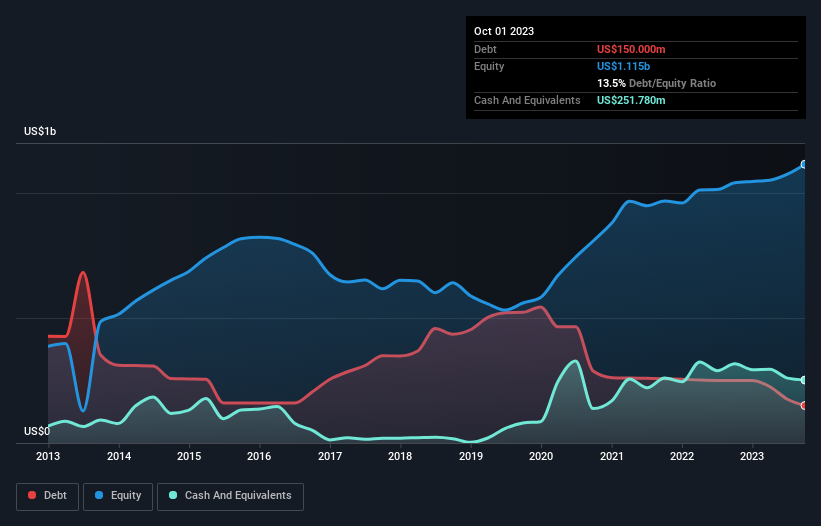- United States
- /
- Food and Staples Retail
- /
- NasdaqGS:SFM
We Think Sprouts Farmers Market (NASDAQ:SFM) Can Stay On Top Of Its Debt

Some say volatility, rather than debt, is the best way to think about risk as an investor, but Warren Buffett famously said that 'Volatility is far from synonymous with risk.' So it might be obvious that you need to consider debt, when you think about how risky any given stock is, because too much debt can sink a company. We can see that Sprouts Farmers Market, Inc. (NASDAQ:SFM) does use debt in its business. But the more important question is: how much risk is that debt creating?
When Is Debt A Problem?
Generally speaking, debt only becomes a real problem when a company can't easily pay it off, either by raising capital or with its own cash flow. Ultimately, if the company can't fulfill its legal obligations to repay debt, shareholders could walk away with nothing. However, a more frequent (but still costly) occurrence is where a company must issue shares at bargain-basement prices, permanently diluting shareholders, just to shore up its balance sheet. By replacing dilution, though, debt can be an extremely good tool for businesses that need capital to invest in growth at high rates of return. When we think about a company's use of debt, we first look at cash and debt together.
View our latest analysis for Sprouts Farmers Market
What Is Sprouts Farmers Market's Debt?
You can click the graphic below for the historical numbers, but it shows that Sprouts Farmers Market had US$150.0m of debt in October 2023, down from US$250.0m, one year before. However, it does have US$251.8m in cash offsetting this, leading to net cash of US$101.8m.

How Healthy Is Sprouts Farmers Market's Balance Sheet?
According to the last reported balance sheet, Sprouts Farmers Market had liabilities of US$541.5m due within 12 months, and liabilities of US$1.63b due beyond 12 months. On the other hand, it had cash of US$251.8m and US$16.2m worth of receivables due within a year. So it has liabilities totalling US$1.91b more than its cash and near-term receivables, combined.
This deficit isn't so bad because Sprouts Farmers Market is worth US$4.78b, and thus could probably raise enough capital to shore up its balance sheet, if the need arose. But it's clear that we should definitely closely examine whether it can manage its debt without dilution. While it does have liabilities worth noting, Sprouts Farmers Market also has more cash than debt, so we're pretty confident it can manage its debt safely.
Fortunately, Sprouts Farmers Market grew its EBIT by 9.0% in the last year, making that debt load look even more manageable. When analysing debt levels, the balance sheet is the obvious place to start. But it is future earnings, more than anything, that will determine Sprouts Farmers Market's ability to maintain a healthy balance sheet going forward. So if you're focused on the future you can check out this free report showing analyst profit forecasts.
Finally, a business needs free cash flow to pay off debt; accounting profits just don't cut it. Sprouts Farmers Market may have net cash on the balance sheet, but it is still interesting to look at how well the business converts its earnings before interest and tax (EBIT) to free cash flow, because that will influence both its need for, and its capacity to manage debt. Over the most recent three years, Sprouts Farmers Market recorded free cash flow worth 73% of its EBIT, which is around normal, given free cash flow excludes interest and tax. This free cash flow puts the company in a good position to pay down debt, when appropriate.
Summing Up
Although Sprouts Farmers Market's balance sheet isn't particularly strong, due to the total liabilities, it is clearly positive to see that it has net cash of US$101.8m. The cherry on top was that in converted 73% of that EBIT to free cash flow, bringing in US$265m. So we are not troubled with Sprouts Farmers Market's debt use. When analysing debt levels, the balance sheet is the obvious place to start. But ultimately, every company can contain risks that exist outside of the balance sheet. For example, we've discovered 1 warning sign for Sprouts Farmers Market that you should be aware of before investing here.
When all is said and done, sometimes its easier to focus on companies that don't even need debt. Readers can access a list of growth stocks with zero net debt 100% free, right now.
New: Manage All Your Stock Portfolios in One Place
We've created the ultimate portfolio companion for stock investors, and it's free.
• Connect an unlimited number of Portfolios and see your total in one currency
• Be alerted to new Warning Signs or Risks via email or mobile
• Track the Fair Value of your stocks
Have feedback on this article? Concerned about the content? Get in touch with us directly. Alternatively, email editorial-team (at) simplywallst.com.
This article by Simply Wall St is general in nature. We provide commentary based on historical data and analyst forecasts only using an unbiased methodology and our articles are not intended to be financial advice. It does not constitute a recommendation to buy or sell any stock, and does not take account of your objectives, or your financial situation. We aim to bring you long-term focused analysis driven by fundamental data. Note that our analysis may not factor in the latest price-sensitive company announcements or qualitative material. Simply Wall St has no position in any stocks mentioned.
About NasdaqGS:SFM
Sprouts Farmers Market
Engages in the retailing of fresh, natural, and organic food products under the Sprouts brand in the United States.
Outstanding track record with excellent balance sheet.


